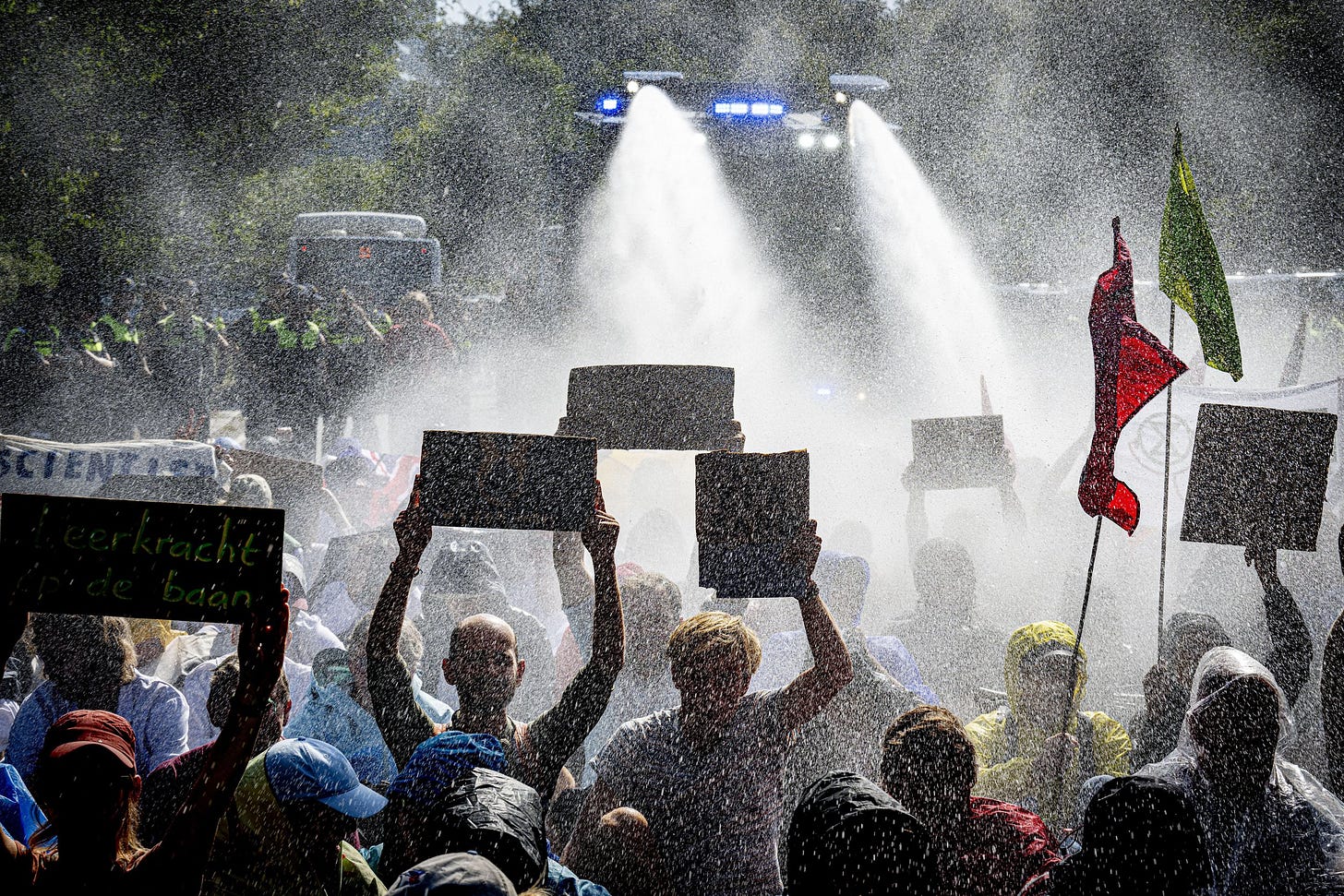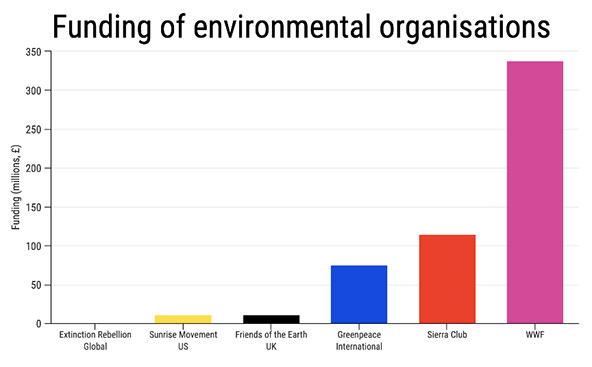Do We Really Need Another Climate Conference?
An article I wrote for my local newspaper about a recent climate conference and the criticism the piece received.

I wrote this article as an opinion piece for my local paper here in Sogndal, Norway. I am posting it here because I think that the conference I am describing also depicts similarly many of the conferences and events on climate that people in the outdoor industry (and wider climate movement) attend. You know the ones - you post on LinkedIn a few days before saying you will be there incase anyone wants to “connect”, you sit and listen to panel discussions about melting glaciers and “purpose driven adventure” , you sip drinks in the evening and talk to people about “transformative change”, “the net-zero transition” or how we can advance “multi stakeholder engagement”. For me these kinds of events have evolved into a ritualised performance. Everyone meets up, listens to a few talks or panel debates, hears how bad things are, eats some nice food and then packs up their things and heads home. Only to go to another of these conferences packaged under a different name using different buzzwords a few months later.
The conference that I wrote this article about has happened for the last 10 years in the town that I live in. Two years ago I was asked to give one of the speeches in the evening. I think everyone was expecting a nice friendly talk that they could sip their beer while listening to. I instead decided to use the opportunity to really challenge the people sitting in front of me. I told them about how slavery was ended, how the freedom riders literally risked their lives to push forward civil rights in the USA and that 1000 suffragettes had to go to prison in the UK to win the right to vote for women. Many of them are leaders in the climate sphere in Norway. So I challenged them as to why they weren’t looking more to history to see how to create change. I along with a few others even organised a protest down the high street of the town the day after so they had a ready baked pathway to action to sign up to straight after the talk. How many of the hundred or so sitting in front of me joined it? Maybe 5 or 6. So this year I decided I wanted to write this article for the local paper reflecting two years later on where we stand now. I have faced a bit of criticism for the article in the last week. One respected researcher told me I was splitting the movement and doing the climate cause a disservice. I will respond to this criticism at the end of the article.
Here you go 👇
Do We Really Need Another Climate Conference
This week it is the annual climate conference here in Sogndal. Tomorrow evening we are all invited to a "Climate Party" at the Quality Hotel. You know the drill - we all listen to a polite sofa conversation about how bad things are and the lack of action, we all nod our heads in agreement - feeling good about ourselves for “being engaged”. The title of this piece may seem provocative, and hopefully I have lured in a few climate deniers who think I'm about to describe how we should stop conferences on climate change altogether. But no - what I will argue is that if we really take in over ourselves the seriousness of the situation that we are heading into in the coming decades - then the time for polite conversations about “the climate” are over.
I gave a talk at this conference two years ago. In that talk I quoted Sir David King, the former Chief Scientific Adviser to the UK Government. I told the audience that Sir David King warned in 2021 that: “We are in a desperate situation. What we do over the next three to four years, I believe, is going to determine the future of humanity. We are in a very very desperate situation.” Three to four years - he said that back in 2021. We are now in 2025 and where are we at? Yet more conversations. More panel debates. More sofa conversations. More nodding heads.
I find the disconnect between what people say at these conferences and their action quite staggering. We are on track for 2.7 degrees of warming under current climate pledges. Researchers have estimated that over 2 billion people will be pushed out of the safe living conditions for humanity if the world warms by this much. This does not mean that these billions of people will simply move to cooler places. How do you think that we will possibly deal with this level of migration? What this means is social collapse, war and mass death. If we could still limit temperature increase to 1.5 degrees the number of people that would be pushed outside of the safe living conditions for humans would be cut by 80%. I believe that future generations will look back on the failure of us in these times to deal with this problem as one of the most evil periods in history. As we sit around sipping our drinks and having polite conversations about the climate crisis - we are condemning billions of people to immense suffering and pain over the coming decades by our lack of action.
We know what the problem is and if we look to history we know how to deal with it. We live in an economic system that is simply not fit for purpose. The climate crisis is just a symptom of the disease which is called late stage capitalism. The idea that we can have eternal growth forever and still live in harmony with nature and the climate is a fairytale. We need a massive re-prioritisation of what is being produced and which parts of our economy is growing. We need massive investment in renewables, public transit and making sure Norway is self-sufficient when it comes to food. We do not need more private jets, gondolas into our national parks or cheap airline tickets. The other major problem - the fossil fuel industry - has lied, lobbied and influenced their way out of the climate problem for decades. It is time that they were regulated out of existence and forced to adopt different business models. It is completely obvious by now that they will not do this themselves. The job of companies like Equinor is to provide profit and dividends to their shareholders - if they make more profit from selling oil and gas that is exactly what they are going to sell.
These massive changes will not come from being experts at talking at climate conferences. We have to look to history. The suffragettes didn't win voting rights through polite conversations. The civil rights movement didn't end segregation through panel discussions. Gandhi didn't free India through sipping drinks and posting about the next conference he was attending on LinkedIn. Real change has required sacrifice and direct action that disrupted the status quo and made continuation of business-as-usual impossible.
Nice events like climate conferences cater to privileged audiences who can afford to treat the climate crisis as an intellectual exercise rather than an existential threat. Meanwhile, millions of people are already having their lives turned upside down. While we listen to people chat on a sofa about how to tell better stories about the climate, others are losing their homes, livelihoods, and lives to climate disasters.
These annual conferences have evolved into ritualised performances: researchers present their findings, the audience express appropriate concern, everyone agrees something must be done - and then everyone goes home again. The pattern repeats endlessly, creating an illusion of progress while actually serving as a substitute for meaningful change. We have all become experts at talking about the climate crisis while avoiding the uncomfortable actions necessary to address it.
Imagine if the time, energy resources, and attention devoted to organizing and attending these kind of events could be redirected toward organizing civil disobedience that directly challenges the political and economic systems perpetuating the problems facing the world?

I don't write this to discourage people from being engaged and getting educated - these are totally necessary foundations. But attending a climate conference is not a sufficient response to our current emergency. Our house is on fire, and we're scheduling another conference to discuss fire safety protocols.
The climate crisis is the biggest issue of our time. It demands more than our words and thoughts—it demands our bodies on the line, our comfort sacrificed, our privileged routines disrupted. Because if we're not willing to disrupt ourselves, how can we hope to disrupt the systems that are destroying our planet?
The time for yet another climate conference, in my opinion, is over. I hope that everyone that attends this year, everyone that understands the seriousness of not acting, finds out how they can take their engagement further.
There is no doubt that what we do, every single one of us, during these crucial decades will be judged by future generations.
The Criticism
The criticism that I received for this article basically centred on three things: that I was dividing the movement, that I was historically inaccurate because the movements I talk about all required collaboration between multiple approaches and I am being counter productive because it basically looks like I am trying to demand that everyone should do what I say. Rather than understanding that not everyone is going to be part of the “radical flank” of a movement.
I will go through these 3 critiques and try to explain my thoughts around each one.
1. That I divide the movement by writing articles like this
I think this is an interesting one because I actually received quite a few messages from people saying how they thought the article was spot on and that they felt the same. These were people who I have not really engaged much before with on climate issues. To be quite honest for me this is kind of a tactic behind writing articles like this. I want to get across something very different to the communications that conferences like that get across. In doing this I am trying to engage a set of people that are simply not that engaged at the moment. I think its actually very interesting that really the only people that seemed to think an article like this was dividing the movement were those involved in the conference itself.
I do understand the point - that its a classic problem that we end up fighting each other instead of focusing our attention on those in power. I guess this is exactly the point that I am trying to get across though. That while so much resources, time and effort is devoted to people attending nice conferences like this - we forget to focus out attention on creating real political change that can go up against the systems and industries which are driving us towards 2.7 degrees of warming.
2. That I am historically inaccurate and forget that it wasn’t just direct action that led to success in the past
I do agree with this point. I dont think I accurately get across in the article the myriad of different ways that change has happened in the past. It has not been JUST direct action and civil resistance. I do understand that conferences are an important way to built networks and all that. What I think I am trying to get at though is the disproportionate amount of resources, funding and effort at the moment that goes into things like conferences compared to direct action and civil resistance. As I said before - there were 1000 people jailed in the UK fighting for women’s suffrage. In Norway there are basically a handful of people involved right now in climate civil resistance campaigns, with almost no funding to be seen. I understand that we are in an ecology of change with many different ways of taking action - but at the moment that ecology is very much one sided. There is a major part which does not get the resources it actually deserves which is the radical, loud and effective protest movement.

Research by the Social Change Lab shows that protest movements are woefully underfunded compared to other parts of the ecology of change. Check out the figure below showing the amount of funding XR gets compared to WWF. The figure above shows the effectiveness of protest movements at keeping carbon dioxide out of the air compared to policy advocacy and carbon offsetting.
I do think that conferences like the one I am talking about in the article are part of the problem. They create the illusion of progress while actually serving as a substitute for meaningful change - we become experts at simply talking about the problem. Imagine if some of the researchers who attended these conferences dared speak up and support the activists who are on the frontlines of creating political change? Or even joined the frontlines themselves. I get critique for not talking about the myriad of ways to create change - but at the same time I hardly ever see the people attending conferences like this ever recognise disruptive protest as a legit tactic themselves. The lack of solidarity is always quite disappointing to be honest.
3. That articles like this are counter productive
My response to this is that basically I just dont think people are taking our current situation seriously enough. I think they need woken up and I just simply think this will not happen from attending yet another climate conference. The science is pretty clear - we are rapidly approaching multiple irreversible tipping points, and the polite conference approach, in my opinion, simply does not generate the scale or speed of action required.
I also think it is very important with critical reflection. There seems to be an unwritten rule in these spaces that you cannot critique certain approaches without being accused of undermining solidarity. So many times I have come with reflection like this and I am shut down with the same “its counter productive to complain about people who you are on the same side with”.
I just dont get it. Why cant we reflect over each others tactics? I mean jeez - we who are engaged with disruptive protest face critique from every single corner of society on a daily basis. I think a large part of the problem is that there is a whole industry that has been created around people attending conferences. Consultants, speakers, brands, organisers, venue providers—all with a common interest in the continuation of them. Why shouldn’t we be able to critique openly? The actual counter productive approach in my opinion is to continue investing resources in methods with fairly insufficient outcomes while at the same time calling critique of these methods “counter productive”.
I don’t believe by levelling some critique I am attacking allies or asking everyone to drop everything and join the radical flank. I'm just asking that we collectively rise to the actual challenge before us rather than settling for comfortable rituals that create an illusion of progress while emissions keep rising and rising and rising. Remember that figure from the article - if we could still limit temperature increase to 1.5 degrees the number of people that would be pushed outside of the safe living conditions for humans would be cut by 80%.
We are in a literal race against time. Why should we not treat it as such and reflect more over what we are doing so we can be more effective?
I am really interested to hear what people think. Is the criticism of my article valid? Are articles like this which challenge people on the same side counter productive? Do you think the radical flank is effective and should receive more resources? Is it historically inaccurate of me to constantly push the importance of the disruptive protest part of movements in the past and forget about all the other things that contributed?
Let me know in the comments or send me an email at calum.m.macintyre@gmail.com!
Next Tuesday I will write about the action I was part of last summer at Oslo Airport and the absolutely crazy difference in legal consequences for those that tried to do basically the exact same thing in the UK. Many of them are getting sentenced this month after sitting in prison on remand since last summer. So I thought it was an appropriate time to write about why they are facing such different legal outcomes than us sitting here in Norway and what it means for our democracies.






These days I increasingly think any engagement with 'activism' needs to begin with one simple question - 'What course of action should I undertake to really tangibly impact the cause I care about?'
In most cases, I would be somewhat surprised if the truthful answer to this question was 'I should pay through the nose to attend a climate conference'.
Pal, your voice is such a crucial one in the movement right now, and your line about becoming experts about talking about climate is a difficult, but essential one to hear. Also as a neurodiverse girly I'm absolutely loving the audio format and it really delivers the impact when I can listen. Well done.